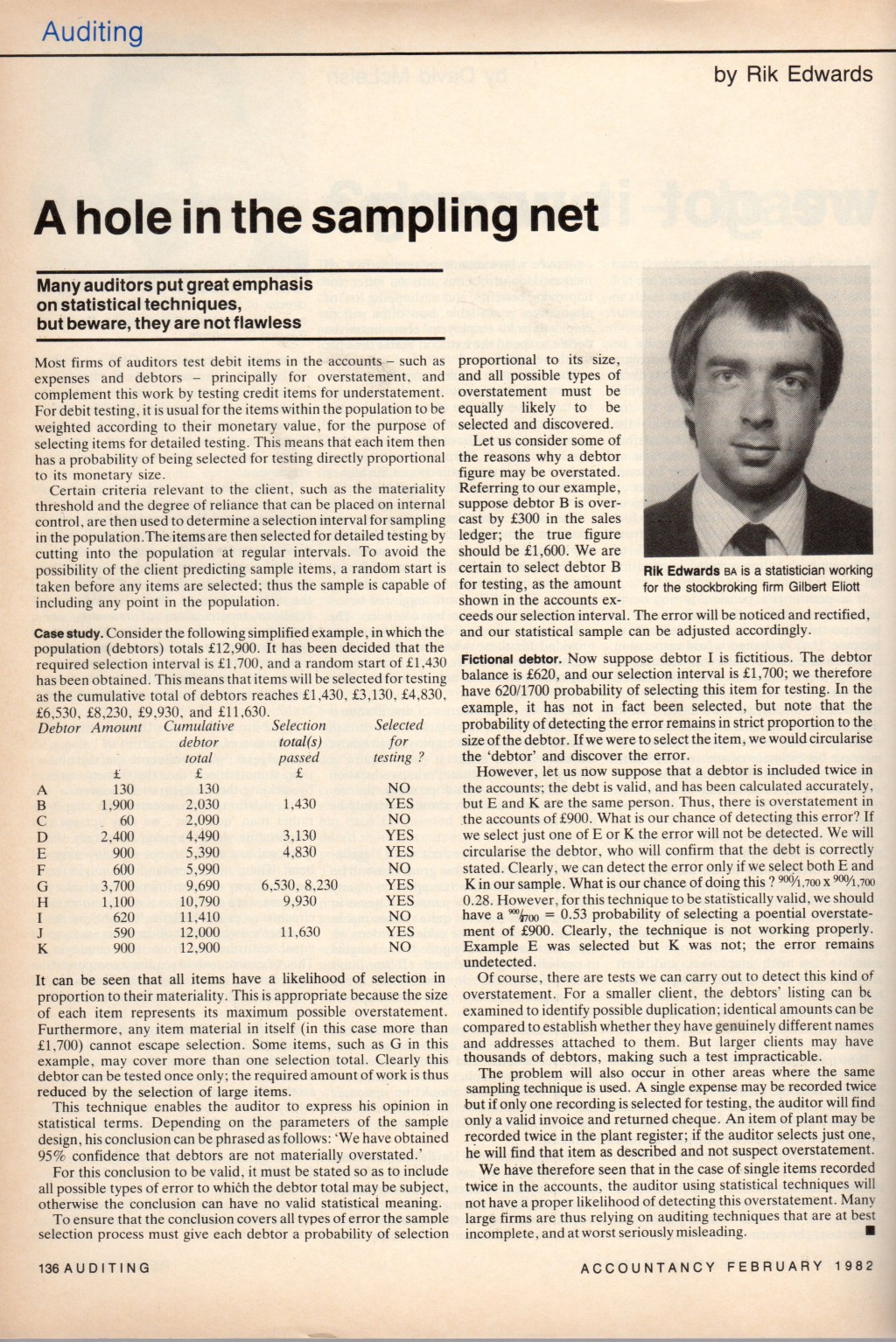(From Accountancy magazine, February 1982)
Gripping read, isn’t it? That’s how I spent my leisure time when I was 25. It’s the most important thing I’ve ever written, by a wide margin. Having left Deloitte Haskins & Sells the previous year citing technical differences with the examiners, I obtained a measure of closure by getting this article – criticising an aspect of their audit techniques – published in Accountancy, the most widely read magazine of that profession.
As a failed accountant, I didn’t exactly have the world at my feet. An employment agency sent me along for an interview for the role of assistant in the two-man statistics department of a small, specialised stockbroking firm, Gilbert Eliott & Co. I reported back that I did like the idea of working at a stockbrokers, but the job seemed pretty dull. The agency gave me some excellent advice: once I got settled in, she said, if I showed promise I could get the opportunity to try out on the sales desk, where the money was made.
So I had settled for a fairly dull job as assistant in the two-man Statistics department of a small, specialised stockbroking firm, Gilbert Eliott & Co. My boss Dick was about sixty, and I could see my future etched in his closed, tetchy old face, measured in endless priority percentage calculations, monthly preference and bond updates, and in thirty-nine annual fixed interest handbooks.

But one day while Mr George Baylis FCA – the firm’s personnel officer and a qualified accountant – was enjoying his complimentary copy of Accountancy, my face stared back at him from page 136. He let me know he had seen the article, and he must have mentioned it to his fellow partners. Within a week, the head of the preference department, Peter Thompson, had come into our tiny office – carefully choosing the hour when Dick was at lunch – and asked whether I would like to transfer to his department: initially to help with administration and dealing, but with a view to graduating to broking.
In the early 1980s the City was still largely populated by the old guard of aristocratic third sons, blackguards unsuited for the army or the church and old gents wandering in to to the office at ten from the Waterloo train, disappearing for lunch between one and four. Many were lazy, some were plain stupid. Steadily they were being replaced by sharp- witted lads from Essex, grammar school boys and even the odd graduate.
So when Mr Thompson made his offer, I didn’t hesitate. Given the calibre of some of my colleagues, it shouldn’t be difficult to make a mark. My knowledge of the stocks was comprehensive after the stats training, but the sales aspect of the job didn’t come easily: for a long time I was nervous of making a fool of myself on the telephone.
The partners must have thought the safest course was to assign me accounts where the firm was doing little business, so I couldn’t do much damage, and might improve our revenue there. After a slow start – Mr Wild, one of the partners, had to take me out to lunch to remind me that I was supposed to be bringing in new business as well as looking after the admin – ambition eventually overcame fear. One lunchtime when I was alone, minding the shop, it was as if a switch had been flicked in my head: suddenly I knew what to do. I made four sales calls, and two of them were successful. The two partners on the desk came back to a couple of decent dealing slips they hadn’t expected.
But the day I really got my feet under the desk was in 1983, on 3rd August which happens to be my birthday. A fund manager from a previously barren account which I had been carefully (but so far unsuccessfully) cultivating – supplying a stream of what I hoped was helpful information and analysis – called me up out of the blue. “Are you busy this morning?’ she asked. “Oh, one or two things on” I lied. She ignored my reply and pressed on. “Well, you will be now. Have you got a pen and paper? I want to sell these.” And she read out a long list of holdings. Over the day we got all the business done. Now I knew I could do the job.
Of course, the problem for the firm in assigning its barren accounts to the new guy was that I now knew that the revenue I had generated attached to me personally as much as it did to the firm. This made me confident of what I was worth to my employer, current or future.
And if a person gives you something, it is instinctive to thank them. But when Mr Thompson handed me a bonus slip representing an amount of money I could only have dreamt of three years earlier – and of course exceeding the social value of my work by a huge factor – I resisted the impulse to thank him. I simply nodded acknowledgement and said “OK.” Because the bonus was clearly a miserly percentage of the increased revenue I had brought in.
This was Thatcher’s decade, the age of the yuppie. Before long, opportunity knocked again in the shape of an approach from a rival firm. “Big Bang” was on the horizon, and broking firms, buoyed with cash from US and other banks, were aggressively recruiting. When Simon & Coates (soon to trade as Chase Manhattan) named the salary they were proposing to pay me – roughly triple what I had been earning before – I needed time to consider it. About three seconds. I tried to contain my excitement. “I think that sounds reasonable” I said. I was on my way. And all thanks to that very dull article.

Leave a comment